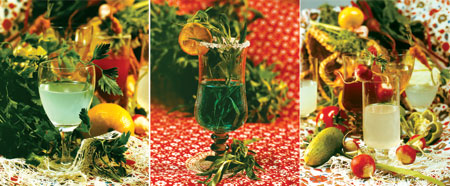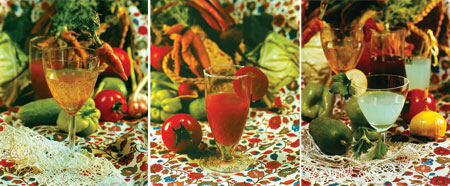Pages 100-103
By Ahmad-Jabir Ahmadov
Every nation has its favourite beverage. Russians like to drink kvass, Germans and Czechs like beer, Bulgarians like boza, Americans like Coca-Cola, while Azerbaijani people prefer to drink sherbet. Sherbet is considered the most refined of soft drinks in Azerbaijan. After dinner, sherbets prepared from lemon, basil, mint, saffron, or other aromatic herbs, along with various fruits and berries, are served.
Sherbets, as a symbol of celebration, are consumed at weddings, dinner parties, banquets and similar events. They are also served with pilaf.
When preparing sherbets and sweet drinks, hot or warm water and alcohol are infused with aromatic herbs for 8-12 hours, and the resulting mix is strained. Then, sugar is added, it is heated and left to cool. Other ingredients are then added according to the recipe, and, if necessary, it is strained once again, chilled and served.
Gandab Sherbet
Sugar – 100 g, honey – 50 g, herb syrup – 100 ml, water – 800 ml.
Dissolve the sugar in hot water and add the honey. Flavour the resulting sherbet with syrups obtained from equally strong aromatic herbs (yarrow, violet willow, mint, catnip etc.) Gandab sherbet has the quality of increasing one’s appetite. It is served with pilafs and other Azerbaijani dishes that are rich in fat. It also facilitates digestion. In traditional medicine, syrup sherbet is used to prevent general weakness, anaemia and dizziness.
Rose Sherbet
Sugar - 120 g, basil or mint seeds - 8 g, rose oil – 0.25 g, water - 800 ml, ice – 200g. Add the basil or mint seeds to boiled water at a temperature of 45-550 C and leave for 3-4 hours. Then strain the resulting mixture. Add sugar and rose oil and leave to cool. Add the ice before serving.
Apricot Sherbet
Sugar - 60 g, dried apricots – 500 g, water – 800 g, ice - 100 g. Rinse the dried apricots in cold water together with their stones. Then pour hot water over them and leave to soak for one day. Strain the resulting mixture through gauze and, if necessary, add the sugar. Add the ice before serving. Serve the swollen apricots on a separate plate.
Apricot sherbet has a therapeutic-prophylactic effect on constipation and high blood pressure. One may also use prunes to prepare a similar sherbet.
Saffron Sherbet
Sugar - 120 g, saffron – 0.6 g, basil or mint seeds – 0.4 g, water - 800 ml, ice - 80 g.
Leave the basil or mint seeds, together with the saffron, to soak in boiled water for 3-4 hours. Then strain the resulting mixture and mix with sugar.
Add the ice before serving. A teaspoon of citric acid may be added to improve the taste.
Caraway Sherbet
Caraway seeds – 0.4 g, coriander seeds – 0.5 g, cardamom seeds – 0.4 g, sugar - 200 g, water - 600 ml, ice - 200 g.
Leave the caraway, coriander, and cardamom seeds to soak in boiled water for 3-4 hours, then strain the mixture and mix with sugar. Add the ice before serving.
Iskanjabi Sherbet
Sugar – 160 g, grape vinegar - 60 g, fresh mint - 100 g, water - 800 ml, ice - 80 g.
Wash the fresh green mint, then incise a little and boil it in grape vinegar with sugar. Leave it to cool for 4-6 hours. Then dilute with water and strain the mixture. Add the ice before serving.
Rose-Pomegranate Sherbet
Sugar - 80 g, rose water - 40 g, pomegranate juice - 400 ml, water - 500 ml, ice - 80 g.
Squeeze ripe Guloysha pomegranates and strain through gauze, then mix the juice with sugar. Boil and cool the water, add 1-2 tablespoons of rose water and add this to the pomegranate juice and sugar mixture. Pour into glasses with ice cubes. Serve with tika-kebabs and lula-kebabs.
Lemon Sherbet
Sugar - 200 g, medium-size lemon - 1, saffron – 0.4 g, basil or coriander seeds – 0.4 g, water - 600 ml, ice - 200 g.
Peel the lemon and slice into small pieces. Then pour water at 45-500 C over the lemon and add basil or coriander seeds. Leave the mixture for 3-4 hours, then strain and mix with a syrup previously prepared from sugar and lemon pulp; leave to cool. Add saffron tincture and ice when serving. Cardamom may be used instead of basil seeds. Cardamom gives more flavour and delicacy to the taste. To prepare a saffron tincture, soak the saffron in boiled and cooled water for 6-8 hours.
Fruit Sherbet
Lemon juice - 80 ml, orange juice - 160 ml, 4 grams of black velvet tea in 50 ml water, sugar - 100 g, 4 x 5 gram lemon slices, 4 x 10 gram orange slices, 40 g of berries (strawberry, raspberry, cherry etc), mint leaves - 40 g, ice - 80 g.
Brew the tea and leave it to cool. Then mix the tea with the sugar together with the lemon and orange juice. Add the mint leaves, berries, lemon and orange slices and ice before serving.
Sherbet with mint
Sugar - 120 g, mint seeds – 1.6 g or green mint - 60 g, water - 600-700 ml, ice - 200 g.
Infuse hot, boiled water with mint seeds for 4-6 hours. To make a tincture of green mint, chop the green mint and pour hot water over it. Then strain the mint tincture and mix with sugar. Add the ice before serving.
Pomegranate Sherbet
Sugar - 120 g, pomegranate juice - 200 ml, water - 600 ml, ice - 80 g.
Dissolve the sugar in boiled water. Squeeze the pomegranate juice into a separate pot. Add the juice to the sherbet and leave the whole mix to cool. Add the ice before serving. Sherbets of this kind can be prepared with juice obtained from fruit and berries such as cherries, strawberries, raspberries, blackberries, currants, bilberries etc.
Оvshala
Sugar - 120 g, rose petals - 80 g, citric acid – 0.4 g (or prepared rose water – 0.5 glass), water - 600-700 ml, ice - 80 g.
Dissolve the sugar in the water, mix with rose water and leave to cool. Add the ice before serving. To improve the flavour of the prepared ovshala, rose water may be added. To prepare rose water, pour hot water over rose petals, add citric acid (0.5 teaspoon of citric acid and 2 glasses of hot water for every 8-10 rose petals), and strain after 1 day.
Basil Sherbet
Sugar - 120 g, basil – 1 small bunch, water - 1 litre, citric acid – to taste.
Rinse the basil and chop into large pieces, place in an enamel pot, then add 1 litre of water and sugar. Heat until the water boils, then immediately add citric acid. Let the mix cool, strain through gauze and serve.
Sherbet with sumac
Sugar - 200 g, sumac - 80 g, water - 600-700 ml, ice - 200 g.
Soak the sumac in hot water for 3-4 hours, then strain. Add the sugar and allow the whole mix to cool. Add the ice before serving.
Khoshab
Sugar - 100 g, dried fruit - 150 g, water - 1 litre, rose water - 50 ml.
Pour hot, boiled water over the dried fruit (cherries, greengage plums, cornelian cherries, wild cherries, plums, peaches etc.) Leave the fruit to soak for 1 day while the water absorbs the taste, colour, and flavour of the fruit. Strain the resulting mixture through gauze, mix with sugar and serve. Rose water may be added to khoshab to improve its flavour. Khoshab, as a sour-ish drink, increases the appetite and quenches a thirst. This drink is more common in the Nakhchivan region.
Milk Sherbet
Sugar - 150 g, milk - 500 ml, water - 350 ml, vanillin – 0.1 g (instead of vanilla: cardamom - 1 g, coriander seeds - 1 g, rose water – 0.5 glass).
Boil the milk and let it cool. Boil the water, mix in the sugar, let it cool and then mix with the prepared milk. To flavour the mix, vanilla or rose water (obtained from either rose or violet willow), cardamom and coriander seeds may be added.
Milk sherbet is a ceremonial drink. Celebrants of the Prophet Muhammad’s birthday receive milk sherbet, which is whiter than snow, sweeter than honey, and cooler than ice. Just for this reason, milk sherbet has been a part of our nation’s everyday life since ancient times.
By Ahmad-Jabir Ahmadov
Every nation has its favourite beverage. Russians like to drink kvass, Germans and Czechs like beer, Bulgarians like boza, Americans like Coca-Cola, while Azerbaijani people prefer to drink sherbet. Sherbet is considered the most refined of soft drinks in Azerbaijan. After dinner, sherbets prepared from lemon, basil, mint, saffron, or other aromatic herbs, along with various fruits and berries, are served.
Sherbets, as a symbol of celebration, are consumed at weddings, dinner parties, banquets and similar events. They are also served with pilaf.
When preparing sherbets and sweet drinks, hot or warm water and alcohol are infused with aromatic herbs for 8-12 hours, and the resulting mix is strained. Then, sugar is added, it is heated and left to cool. Other ingredients are then added according to the recipe, and, if necessary, it is strained once again, chilled and served.
Gandab Sherbet
Sugar – 100 g, honey – 50 g, herb syrup – 100 ml, water – 800 ml.
Dissolve the sugar in hot water and add the honey. Flavour the resulting sherbet with syrups obtained from equally strong aromatic herbs (yarrow, violet willow, mint, catnip etc.) Gandab sherbet has the quality of increasing one’s appetite. It is served with pilafs and other Azerbaijani dishes that are rich in fat. It also facilitates digestion. In traditional medicine, syrup sherbet is used to prevent general weakness, anaemia and dizziness.
Rose Sherbet
Sugar - 120 g, basil or mint seeds - 8 g, rose oil – 0.25 g, water - 800 ml, ice – 200g. Add the basil or mint seeds to boiled water at a temperature of 45-550 C and leave for 3-4 hours. Then strain the resulting mixture. Add sugar and rose oil and leave to cool. Add the ice before serving.
Apricot Sherbet
Sugar - 60 g, dried apricots – 500 g, water – 800 g, ice - 100 g. Rinse the dried apricots in cold water together with their stones. Then pour hot water over them and leave to soak for one day. Strain the resulting mixture through gauze and, if necessary, add the sugar. Add the ice before serving. Serve the swollen apricots on a separate plate.
Apricot sherbet has a therapeutic-prophylactic effect on constipation and high blood pressure. One may also use prunes to prepare a similar sherbet.
Saffron Sherbet
Sugar - 120 g, saffron – 0.6 g, basil or mint seeds – 0.4 g, water - 800 ml, ice - 80 g.
Leave the basil or mint seeds, together with the saffron, to soak in boiled water for 3-4 hours. Then strain the resulting mixture and mix with sugar.
Add the ice before serving. A teaspoon of citric acid may be added to improve the taste.
Caraway Sherbet
Caraway seeds – 0.4 g, coriander seeds – 0.5 g, cardamom seeds – 0.4 g, sugar - 200 g, water - 600 ml, ice - 200 g.
Leave the caraway, coriander, and cardamom seeds to soak in boiled water for 3-4 hours, then strain the mixture and mix with sugar. Add the ice before serving.
Iskanjabi Sherbet
Sugar – 160 g, grape vinegar - 60 g, fresh mint - 100 g, water - 800 ml, ice - 80 g.
Wash the fresh green mint, then incise a little and boil it in grape vinegar with sugar. Leave it to cool for 4-6 hours. Then dilute with water and strain the mixture. Add the ice before serving.
Rose-Pomegranate Sherbet
Sugar - 80 g, rose water - 40 g, pomegranate juice - 400 ml, water - 500 ml, ice - 80 g.
Squeeze ripe Guloysha pomegranates and strain through gauze, then mix the juice with sugar. Boil and cool the water, add 1-2 tablespoons of rose water and add this to the pomegranate juice and sugar mixture. Pour into glasses with ice cubes. Serve with tika-kebabs and lula-kebabs.
Lemon Sherbet
Sugar - 200 g, medium-size lemon - 1, saffron – 0.4 g, basil or coriander seeds – 0.4 g, water - 600 ml, ice - 200 g.
Peel the lemon and slice into small pieces. Then pour water at 45-500 C over the lemon and add basil or coriander seeds. Leave the mixture for 3-4 hours, then strain and mix with a syrup previously prepared from sugar and lemon pulp; leave to cool. Add saffron tincture and ice when serving. Cardamom may be used instead of basil seeds. Cardamom gives more flavour and delicacy to the taste. To prepare a saffron tincture, soak the saffron in boiled and cooled water for 6-8 hours.
Fruit Sherbet
Lemon juice - 80 ml, orange juice - 160 ml, 4 grams of black velvet tea in 50 ml water, sugar - 100 g, 4 x 5 gram lemon slices, 4 x 10 gram orange slices, 40 g of berries (strawberry, raspberry, cherry etc), mint leaves - 40 g, ice - 80 g.
Brew the tea and leave it to cool. Then mix the tea with the sugar together with the lemon and orange juice. Add the mint leaves, berries, lemon and orange slices and ice before serving.
Sherbet with mint
Sugar - 120 g, mint seeds – 1.6 g or green mint - 60 g, water - 600-700 ml, ice - 200 g.
Infuse hot, boiled water with mint seeds for 4-6 hours. To make a tincture of green mint, chop the green mint and pour hot water over it. Then strain the mint tincture and mix with sugar. Add the ice before serving.
Pomegranate Sherbet
Sugar - 120 g, pomegranate juice - 200 ml, water - 600 ml, ice - 80 g.
Dissolve the sugar in boiled water. Squeeze the pomegranate juice into a separate pot. Add the juice to the sherbet and leave the whole mix to cool. Add the ice before serving. Sherbets of this kind can be prepared with juice obtained from fruit and berries such as cherries, strawberries, raspberries, blackberries, currants, bilberries etc.
Оvshala
Sugar - 120 g, rose petals - 80 g, citric acid – 0.4 g (or prepared rose water – 0.5 glass), water - 600-700 ml, ice - 80 g.
Dissolve the sugar in the water, mix with rose water and leave to cool. Add the ice before serving. To improve the flavour of the prepared ovshala, rose water may be added. To prepare rose water, pour hot water over rose petals, add citric acid (0.5 teaspoon of citric acid and 2 glasses of hot water for every 8-10 rose petals), and strain after 1 day.
Basil Sherbet
Sugar - 120 g, basil – 1 small bunch, water - 1 litre, citric acid – to taste.
Rinse the basil and chop into large pieces, place in an enamel pot, then add 1 litre of water and sugar. Heat until the water boils, then immediately add citric acid. Let the mix cool, strain through gauze and serve.
Sherbet with sumac
Sugar - 200 g, sumac - 80 g, water - 600-700 ml, ice - 200 g.
Soak the sumac in hot water for 3-4 hours, then strain. Add the sugar and allow the whole mix to cool. Add the ice before serving.
Khoshab
Sugar - 100 g, dried fruit - 150 g, water - 1 litre, rose water - 50 ml.
Pour hot, boiled water over the dried fruit (cherries, greengage plums, cornelian cherries, wild cherries, plums, peaches etc.) Leave the fruit to soak for 1 day while the water absorbs the taste, colour, and flavour of the fruit. Strain the resulting mixture through gauze, mix with sugar and serve. Rose water may be added to khoshab to improve its flavour. Khoshab, as a sour-ish drink, increases the appetite and quenches a thirst. This drink is more common in the Nakhchivan region.
Milk Sherbet
Sugar - 150 g, milk - 500 ml, water - 350 ml, vanillin – 0.1 g (instead of vanilla: cardamom - 1 g, coriander seeds - 1 g, rose water – 0.5 glass).
Boil the milk and let it cool. Boil the water, mix in the sugar, let it cool and then mix with the prepared milk. To flavour the mix, vanilla or rose water (obtained from either rose or violet willow), cardamom and coriander seeds may be added.
Milk sherbet is a ceremonial drink. Celebrants of the Prophet Muhammad’s birthday receive milk sherbet, which is whiter than snow, sweeter than honey, and cooler than ice. Just for this reason, milk sherbet has been a part of our nation’s everyday life since ancient times.






.jpg)